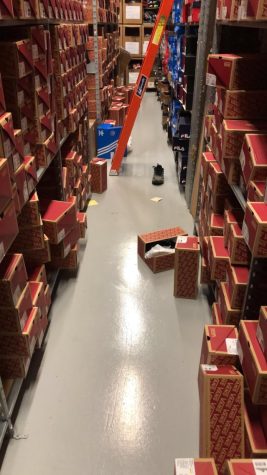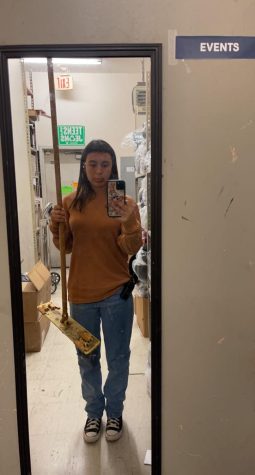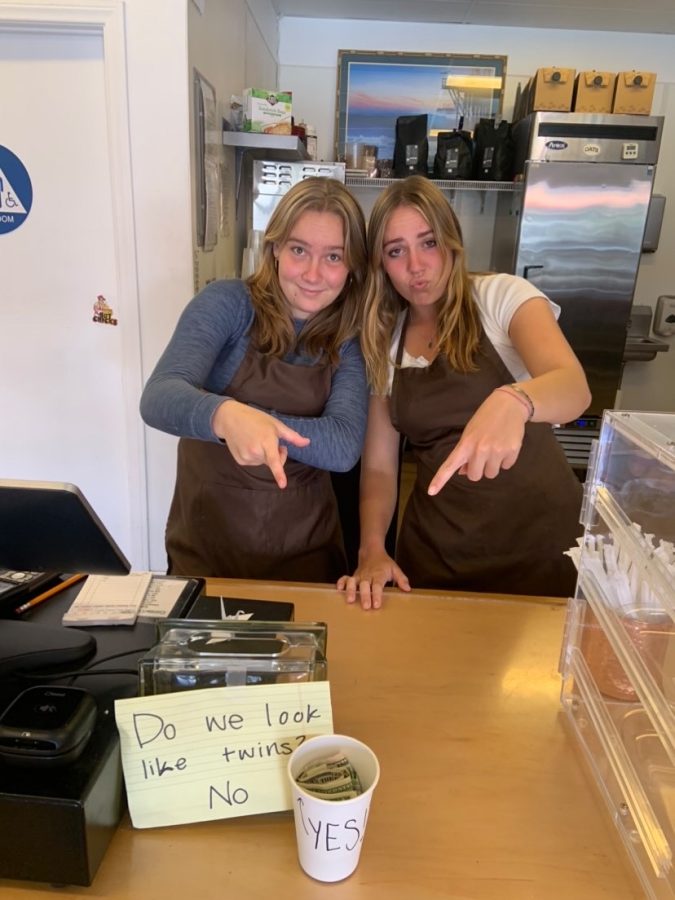Opinion: What can teenagers learn from working?
Hannah Stamp ’23 (left) and Malana Morton ’23 (right) point to the tip jar at The Coffee Copper Pot Cafe. Teens with part-time jobs make money they can use on whatever they prefer. Whether it be their tips or their pay check, they have the freedom to manage their own money. Photo by: Lily Carnaghe
December 6, 2022
Many students don’t need to work but should get a job anyways
Jobs for teenagers offer a variety of skills that will help students in their adult lives. Part-time jobs can help students learn about money management, negotiation, time management and personal responsibilities.
A big stress for teenagers can be where to get money from. Constantly asking parents for money on the verge of adulthood can be embarrassing. Eventually parents will start saying, “No.” This is why a part-time job is great for teens. Getting paid every two weeks and actually working for their own money is a lot more rewarding than money just being handed over. Having their own paycheck also helps manage the value of money and gives a new sense of freedom.
Lily Carnaghe ‘23 said, “I work at the Copper Coffee Pot Cafe across from school. I spend about eight and a half hours at work each week so it’s really not that bad. I think my job is pretty good as a source of easy money and usually it doesn’t disrupt my schedule that much which I like.”
Sophie Gonzalez ‘23 said, “I find my job to be pretty helpful in many areas of my life. I enjoy having my own money and knowing that I am earning it myself. Starting good financial habits now is a big reason as to why I’m working. If I can be responsible with money at 17, I can only hope that I’ll be doing the same when I’m older. I think that having a job is beneficial to my time management as well. It keeps me on a schedule that I otherwise wouldn’t have. I have never been very good with my time management and I can feel it improving as I continue to work. I like knowing how to plan out my days surrounding the time I’m scheduled for.”
An important lesson to learn early on in a teen’s working career is how to spot a hostile work environment and how to get out of one. Not all bosses are good ones, and it is important for people to learn this lesson early on in life. Preferably before they settle into a “real” job. Hostile work environments have a variety of different aspects. Some signs to look out for are a toxic workplace, threatening behavior and discriminatory or racist comments.
Working opens up people’s worlds. Many people work minimum wage or part-time jobs, a lot more than just teenagers. Having a job forces people to work with people they would never usually be in contact with. At any and all workplaces, the staff is forced to be around people with different backgrounds, work ethics and general morals. For the most part, staff has to try their best to get along with each other.

Gonzalez said, “I’m surrounded by many different kinds of people [at work] and I’m their equal despite being younger. It’s an interesting dynamic but I enjoy it.”
Teens can also learn great time management skills from having a job. Even if it is only a couple of shifts a week it is a great way to start managing time independently. Having a job forces people to start making decisions on what to put first in life. It also teaches balance between friendships, relationships, school and work. Along with time management comes the failure to manage time which also holds a valuable lesson. The failure to manage time teaches people to take responsibility for their own actions, reach out to others for help and accept the consequences of their own actions.
Having a job often improves self-confidence. Employers have workers doing many different tasks that they wouldn’t typically do in their day-to-day life. It is almost impossible to avoid these tasks, and instead, employees are forced to take it all head-on. Learning how to do these tasks helps build confidence.
Jaden Elizondo ‘23 said, “Having a job is a good skill to learn maturity and independence, as well as just learning to be more like an adult in general.”
Cecilia Perez ‘23 said, “I think [my job has] has helped me with independence and confidence because [I work] in retail [so] I constantly have to talk to people. I learned how to forget everything else and have a focus method of trying to help someone who comes in the store. Independence is a big [thing for me] because I got the job on my own. My parents knew I was applying but other than that I had no help so I felt a little free knowing I was able to do something [like this alone].”
In the long term work experience for teens is very important and beneficial. Not only does work experience help grow confidence, but it also helps build a great resume for future opportunities.
Perez ‘23 said, “I would recommend a job to others only if they are willing [to put] in the work. It does get a little overwhelming but I think it’s worth it.”

No one wants to hire a person with zero experience over a person with plenty of great experience and references. It’s unethical. Managers want to hire people they can count on. Parents will stop giving their kids money at some point, and they will need to learn how to support themselves. So, why not start early on?









